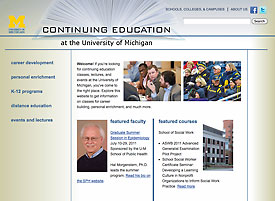The university is launching a new Web portal this month that ties together continuing education offerings from units across campus.
Continuing Education at the University of Michigan, continuinged.umich.edu, offers information on non-degree classes, lectures and events that are available for those interested in career development, personal enrichment, programs for K-12 students and distance education, says Celeste Lee, senior project manager, Office of the Provost and Executive Vice President for Academic Affairs.

“The portal represents a first step in organizing the various offerings on campus into one place, with a larger goal of increasing interest in existing continuing ed, developing new programs and increasing collaboration among units,” Lee says.
In addition to the portal, a 45-member Non-traditional Education Working Group (NEWG) has been formed to encourage coordination and information sharing about opportunities and was charged with developing the Web portal.
“This is the first step to allow people to coordinate, and think about possible collaborations that might result in new programs. We also have a number of programs that could be more subscribed, and having one central access point for continuing education can make these programs easier to find, and perhaps boost participation,” Lee says, adding U-M is the only major research university that has not had this kind of website.
The continuing education portal development is one piece of a larger plan developed by the Non-traditional Educational Programs at U-M task force (NEPU), one of five groups developed in March 2009 by the Prudence Panel — a team of faculty, staff and student leaders who were charged with identifying ways the university could reduce General Fund costs and enhance revenue.
Provost Phil Hanlon stated in his budget plan submitted to the Board of Regents for the coming year that the recommendations received by these task forces have helped shape specific cost reduction and revenue enhancement plans for the long term.
“The NEPU Task Force along with Non-traditional Education Working Group were able to inventory the many, many non-degree educational programs that currently exist on campus,” Hanlon says. “More importantly, the groups recommended mechanisms that will help individuals outside the university identify the opportunities here on campus and help those on campus who are engaged in this work learn from each others’ experiences and contemplate new collaborations. I’m very pleased by the work of both these groups.”
The other four provost task forces from 2009 include:
• Expanding spring and summer instruction.
• Marketing U-M to nonresident undergraduate applicants.
• Creative staffing and shared services.
• Best practices for centers and institutes.
Reports from each group can be found at www.provost.umich.edu/CRRE/introduction.html.
The NEPU task force sought input from across the university via email, and from the three campuses received 380 messages with more than 500 ideas. From these concepts the group identified several recommendations, including:
• Consolidate existing information on current programs at the university.
• Leverage existing expertise to enable Continuing Education program development within academic units.
• Leverage incoming data to encourage the development of interdisciplinary Continuing Education programs.
• Work with the Office of University Development to track alumni participating in Continuing Education programs.
Lee encourages faculty and staff to review the new portal during the current soft-launch phase. To leave feedback about ways to make the site more useful, send an email to [email protected]. The site will be promoted widely to external audiences beginning in October.

